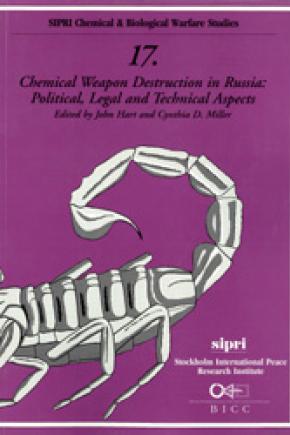Chemical Weapon Destruction in Russia: Political, Legal and Technical Aspects
Contents
1. The problems of Russian chemical weapon destruction (Natalya Kalinina)
2. Russia on the path towards chemical demilitarization (Alexander Chimiskyan)
3. Russia's legal basis for chemical demilitarization (Igor Khripunov)
4. Chemical weapon destruction requirements of the CWC (John Hart)
5. Destruction or conversion of Russian chemical weapon production facilities (John A. Gilbert, Harvey W. Hubbard, Robert F. Pruszkowski and Mark Felipe)
6. Chemical weapon destruction technologies for the Russian CW stockpile (Thomas Stock)
7. Risks posed by the chemical weapon stockpile in the Udmurt Republic (Vladimir Kolodkin)
8. The Russian-US joint evaluation of the Russian two-stage process for the destruction of nerve agents (Irina P. Beletskaya)
9. The role of GosNIIOKhT in the Russian chemical weapon destruction programme (Vladislav Sheluchenko and Anton Utkin)
10. US assistance to Russia's chemical weapon destruction programme (Amy E. Smithson)
11. Chemical weapon destruction in Russia: prospects for increasing assistance to local communities (Cynthia D. Miller)
Annexe A. CWC definitions and terms (John Hart)
About the editors
John Hart (USA) was a Research Assistant on the SIPRI Chemical and Biological Warfare Project in 1996-97. He is co-author of the SIPRI fact-sheet The Chemical Weapons Convention and of chapters in the SIPRI Yearbooks 1997 and 1998. An abridged version of this volume, Unichtozheniye Khimicheskogo Oruzhiya v Rossii: Politicheskiye, Pravovye i Tekhnicheskiye Aspekty, was published in Russian by the Institute of World Economy and International Relations (IMEMO) in 1997.
Cynthia D. Miller (USA) is currently a policy analyst at ANSER, Inc. in Arlington, Virginia, and provides analytical support to the Office of the Assistant to the Secretary of Defense (Nuclear, Chemical and Biological Matters) for the US Chemical Demilitarization Program. She was a Research Analyst in 1996-97 for chemical weapon issues at the Bonn International Center for Conversion (BICC) and is the author of a chapter assessing Chemical Weapons Convention requirements and challenges for international chemical weapon disposal in the BICC volume Conversion Survey 1997: Global Disarmament and Disposal of Surplus Weapons.
About the series editor
Dr Jean Pascal Zanders assumed responsibility for the SIPRI Chemical and Biological Warfare Project in 1996 and is the Series Editor. He was previously Research Associate at the Centre for Peace and Security Studies at the Free University of Brussels. He is the author of a chapter in the 1997 SIPRI volume The Challenge of Old Chemical Munitions and Toxic Armament Wastes, co-author of the SIPRI fact sheets The Chemical Weapons Convention (1997) and Iraq: The UNSCOM Experience (1998), and co-author of chapters in the SIPRI Yearbooks 1997, 1998, 1999, 2000 and 2001. He has also written on regime formation and implementation of the Chemical Weapons Convention and on regional security in the Middle East with respect to chemical and biological weapons.
SIPRI Chemical & Biological Warfare Studies is a series of studies intended primarily for specialists in the field of CBW arms control and for people engaged in other areas of international relations or security affairs whose work could benefit from a deeper understanding of particular CBW matters.
This book can be ordered from all good bookshops and online booksellers or directly from OUP
OUP in the UK:
http://www.oup.com/uk/catalogue/?ci=9780198295693 (paperback)
OUP in the USA:
http://www.us.oup.com/us/catalog/general/?view=usa&ci=9780198295693 (paperback)


